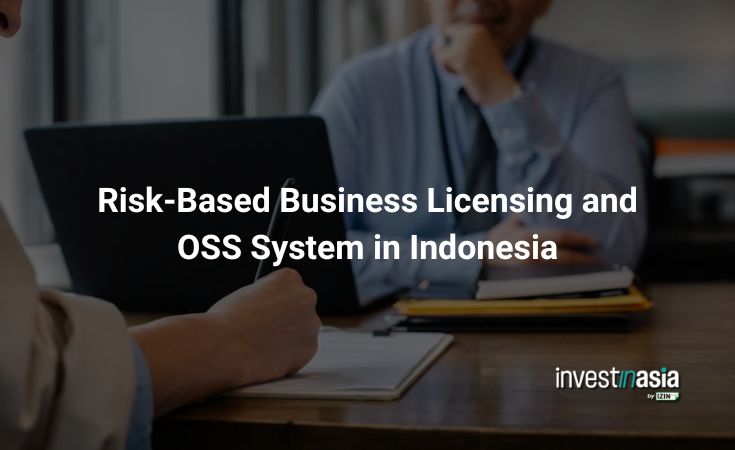On August 9, 2021, the Indonesian government launched a transformative approach to business licensing through the Risk-Based Online Single Submission (OSS) system. This new system simplifies and streamlines the licensing process by categorizing businesses based on risk levels. The goal is to enhance the ease of doing business in Indonesia, especially for foreign companies, investors, and entrepreneurs.
Also read; Exploring the Types of Business Licenses in Indonesia
What is the Risk-Based Business Licensing and OSS System?


The Risk-Based OSS system represents a major reform in business licensing in Indonesia. It assigns licenses based on the risk associated with business activities, ensuring that businesses of different sizes and risk levels have appropriate regulatory requirements. This new paradigm is part of Indonesia’s ongoing efforts to attract foreign investment and create a more business-friendly environment.
President Joko Widodo highlighted the significance of this reform during the system’s launch, noting that it differentiates between Micro, Small, and Medium Enterprises (MSMEs) and larger businesses.
“High-risk businesses require a business permit. Medium-risk businesses require a permit in the form of standard certificate and low-risk businesses only require a permit in the form of registration or Business Identification Number (NIB),” he said, as quoted from the official website of the Cabinet Secretariat of the Republic of Indonesia.
The Risk-Based OSS system is designed to streamline the licensing process by categorizing business activities according to their risk levels and the size of the business, including micro, small, and medium enterprises (MSMEs) as well as large-scale businesses. The system operates based on two key principles:
- Risk Level Determination: Businesses are classified into different risk levels, from low to high, based on risk analysis.
- Business Scale Rating: The system differentiates between MSMEs and large-scale enterprises, allowing for tailored licensing requirements for each.
Also read: Indonesia Free Trade Zone and Free Port (FTZFP): A Complete Guide
Risk Determination and Licensing Requirements
The risk level is determined by an analysis conducted by the government, which takes into account the following factors:
- Identification of business activities
- Hazard level assessment
- Assessment of potential hazards
- Risk level and business scale classification
- Determination of the type of business licensing required
Based on these factors, the appropriate licenses are issued, ensuring that businesses comply with relevant safety, environmental, and operational standards.
Also read: Complete List of Industrial Estates in Indonesia
Categories of Risk-Based Licensing
The OSS system divides businesses into four categories of risk, each with specific licensing requirements:
- Low-Risk Businesses: Only a Business Identification Number (NIB) is needed to operate.
- Medium-Low Risk Businesses: A Business Identification Number (NIB) and Standards Certification are needed.
- Medium-High Risk Businesses: These businesses need an NIB, a Certificate of Standards, and verification by the government.
- High-Risk Businesses: These require an NIB and a more comprehensive operating license, which involves stricter regulatory oversight.
Also read: Top Foreign Investment Sectors in Indonesia
Basic Requirements for Business Licensing
Before any business can start operations, it must meet the following basic requirements:
Spatial Conformity (KKPR)
Businesses must obtain approval for spatial utilization, which includes the following:
- If located in coastal or territorial waters, Marine KKPR Approval (KKPRL) is required.
- If the business is in a forest area, Forest Area Use Approval (P2KH) is necessary.
- These requirements are detailed in Government Regulation (GR) No. 21 of 2021 on Spatial Planning and GR No. 23 of 2021 on Forestry.
Environmental Approval (PL)
Any business activity that impacts the environment must have environmental approval. This may include:
- AMDAL (Environmental Impact Assessment), UKL-UPL (Environmental Management Efforts and Environmental Monitoring Efforts), or SPPL (Statement of Capability for Environmental Management).
- Details are specified in GR No. 22 of 2021 on Environmental Protection and Management.
Building Approval (PBG) and Certificate of Proper Building Functioning (SLF)
- The PBG is needed to build, expand, or maintain a building, and high-risk buildings require government approval.
- The SLF certifies that a building is functional and safe, with oversight by construction supervisory management.
- These requirements are based on GR No. 16 of 2021 on Building Regulations and Law No. 28 of 2002 on Buildings.
Also read: Top Foreign Investors in Indonesia (by Country and Continent)
Risk-Based Business Licensing Regulations
Risk-Based Licensing is further detailed in Government Regulation No. 5 of 2021 (GR 5/2021), which includes:
- Attachment I: Provides KBLI codes, activity descriptions, risk factors, licensing durations, and regulatory bodies.
- Attachment II: Outlines the requirements and obligations for businesses based on their risk levels.
- Attachment III: Provides guidelines for implementing Risk-Based Business Licensing.
- Sector-Specific Standards: Ministries and regulatory bodies will issue further standards for specific industries or business activities.
Also read: Indonesia’s Top Trading Partners (Export-Import)
Steps to Obtain a Business License


Steps for foreign investors to acquire a license via the OSS system:
- Register for a Business Identification Number (NIB): This is the first step in the process, and the NIB is essential for operating any business.
- Complete Business Data: This includes filling out the company’s profile, capital structure, and plans for business activities, including the location and KBLI code.
- Risk Assessment: The OSS system will categorize the business based on risk, determining which licenses are needed.
- Meet Spatial, Environmental, and Building Requirements: Businesses must comply with all relevant spatial, environmental, and building regulations, as mentioned above.
- Final Licensing: Depending on the risk category, businesses may require additional verification before they can commence operations.
Key Sectors Covered by the OSS System
Risk-Based Business Licensing applies to these sectors:
- Maritime Affairs and Fisheries
- Agriculture
- Environment and Forestry
- Energy and Mineral Resources
- Nuclear Power
- Manufacturing
- Trade
- Public Works and Public Housing
- Transportation
- Health, Drugs, and Food
- Education and Culture
- Tourism
- Religion
- Post, Telecommunications, Broadcasting and Electronic System and Transaction
- Defense and Security
- Manpower
Check:
Government Oversight and Benefits for Foreign Investors
The Indonesian government is committed to ensuring that this new system benefits both domestic and foreign investors. President Widodo emphasized that the Risk-Based OSS system should make the licensing process faster, cheaper, and more efficient, boosting investments of all scales across Indonesia. The system also integrates various ministries, regional governments, and special economic zones to create a unified process, making it easier for foreign investors to navigate regulatory requirements.
For foreign businesses planning to invest in Indonesia, the Risk-Based OSS system offers an improved pathway to establish and grow your business. By simplifying the licensing process and categorizing businesses based on risk, the Indonesian government has taken steps to enhance the country’s attractiveness as an investment destination.
However, it is crucial to ensure full compliance with all legal and regulatory requirements. This includes spatial conformity, environmental approvals, and the necessary business permits based on your industry and risk level. Seeking professional advice to navigate these requirements can help ensure a smooth entry into the Indonesian market.
InvestinAsia is among the companies that specialize in aiding you with company registry in Indonesia. We boast a team of seasoned experts who can guide you throughout the process of:
- PMA / Foreign Company registration in Indonesia
- Indonesian Representative office registration
- Indonesian Local Company establishment
- Indonesian Virtual office rent
- Indonesian business registration number
- Indonesian Business Licenses
- Trademark Registration in Indonesia
- Franchise License in Indonesia
If you are interested in starting a business and investment in Indonesia, you can start by contacting us for FREE consultation.
source: Indonesia Investment Guidebook – BKPM




